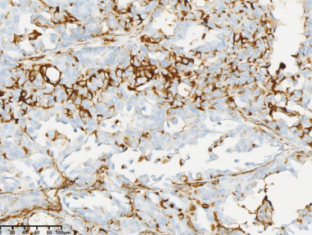Endometrial mesonephric-like adenocarcinoma: Clinicopathologic features, treatment, and outcomes
DOI:
https://doi.org/10.17305/bb.2025.12993Keywords:
Uterine cancer, mesonephric-like adenocarcinoma, clinicopathological features, prognosis, retrospective analysis, KRAS mutationAbstract
Endometrial mesonephric-like adenocarcinoma (MLA) is a rare subtype of uterine corpus endometrial carcinoma (UCEC) first described in 2016. The clinicopathological features, treatment options, and prognosis of endometrial MLA remain poorly understood. In this study, we retrospectively analyzed the clinicopathological characteristics, molecular features, treatment regimens, and outcomes of 11 patients diagnosed with endometrial MLA. The most prevalent symptom observed was postmenopausal bleeding. Notably, 78% (7 out of 9) of patients were diagnosed at advanced FIGO stages (II-IV), with four cases presenting with distant metastasis upon initial examination. Multivisceral metastases were identified in three cases, with lung metastases being the most common, occurring in 45% of patients. The median progression-free survival (PFS) was 16 months (95% confidence intervals: 6-26). All tumors tested negative for progesterone receptors (PR), while 91% of patients (10 out of 11) were negative for estrogen receptors (ER). Most patients exhibited positive immunohistochemical staining for "mesonephric-like" markers, including GATA-binding protein 3 (GATA-3), thyroid transcription factor-1 (TTF-1), and CD10. Furthermore, 91% of patients showed a wild-type p53 immunostaining pattern. Among the 11 patients, five underwent KRAS mutation testing, revealing KRAS mutations in all tested individuals (p.G12D in 2/5, p.G12A in 1/5, p.G12V in 1/5, and p.G13D in 1/5). These findings indicate that 78% of endometrial MLA patients were diagnosed at an advanced stage and suggest that this subtype may exhibit more aggressive behavior compared to endometrial endometrioid carcinoma. The consistent presence of KRAS mutations in patients who underwent testing highlights the potential role of KRAS in the initiation and progression of endometrial MLA, positioning it as a promising therapeutic target.
Citations
Downloads

Downloads
Published
Issue
Section
Categories
License
Copyright (c) 2025 Shuping Yan, Yanpeng Tian, Mingyue Li, Xiaonan Wang, Jiayi Wang, Kuisheng Chen, Tianjiao Lai, Ye Zhang, Xixaoxiao Zhang, Yana Liu, Yuxi Jin, Xueyan Liu, Meng Mao, Qian Wang, Ruixia Guo

This work is licensed under a Creative Commons Attribution 4.0 International License.









